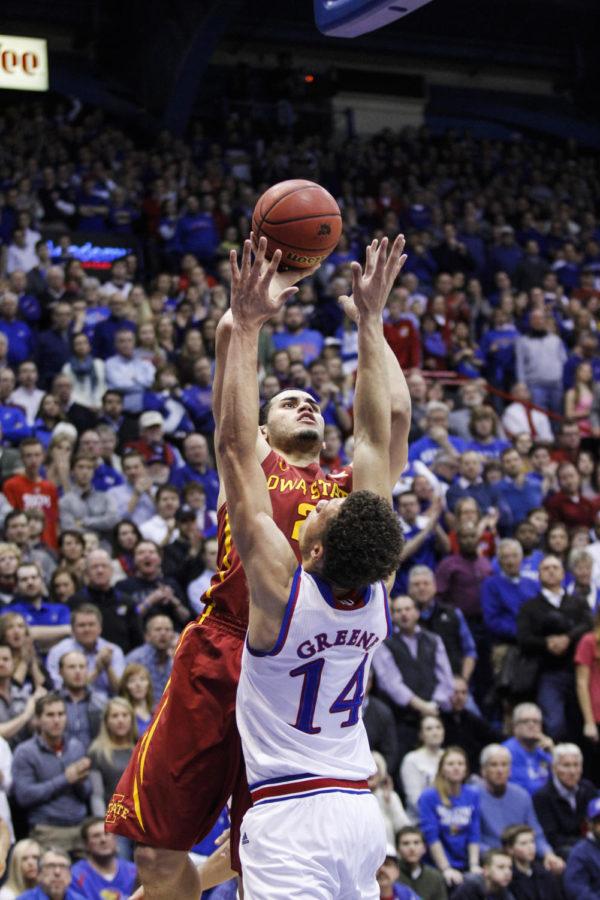Iowa State reserves supplying little respite to starters in recent games
Redshirt junior Abdel Nader attempts a shot at Kansas on Feb. 2. The Cyclones fell to the Jayhawks 89-76.
February 5, 2015
Iowa State’s short bench was first exposed at West Virginia in early January, when the ISU men’s basketball team scratched its way to a two-point victory, despite committing 18 turnovers and dealing with wide-spread foul trouble.
West Virginia made depth at the point guard position a discussion as Iowa State nearly lost hold of the game late in the second half, while floor general Monté Morris watched from the sideline, burdened with four fouls. Iowa State has not won a road game since, and back-to-back poor showings from the reserves have added some weight to questions about the quality of depth on the ISU roster.
“We’re playing eight guys right now and it’s important for all eight guys to go out and play well,” said ISU coach Fred Hoiberg. “And that doesn’t necessarily mean you have to go out and score the ball, but you have to go out and make a contribution when you come in the game.”
No. 8 Kansas proved what Hoiberg already knew when the Jayhawks defeated No. 11 Iowa State handily on Feb. 2. — that the starters and sixth-man Jameel McKay will not always be able to shoulder the entire load, especially against quality opponents.
Despite a performance in which Georges Niang and Morris combined for 36 points, 11 rebounds, 10 assists, three blocks and three steals, the Cyclones failed to muster a real threat to the KU lead at any point in the game’s final 20 minutes.
The bench’s effort against Kansas came on the heels of an unremarkable performance versus Texas Christian, in which the ISU reserves were collectively unable to tally a point until more than 27 minutes into the game.
The ISU reserves saw 51 minutes of court time inside Allen Fieldhouse but produced only eight points, 10 rebounds and two assists on 4-of-13 shooting from the field. Nearly all of that production can be credited to one player, McKay, who has averaged better than nine points, five rebounds and two blocks in his role as the only consistent bench player on the team.
“It’s not necessarily you look at the box score at the end of the game and their bench outscored us 16-8,” Hoiberg said. “It’s more about you need to go in there and do the little things.”
The little things have been hard to find beyond the sixth spot in the rotation thus far this season.
Matt Thomas has struggled to locate his shot, as a correlation appears to exist between a reduction in Thomas’ minutes and a noticeable decline in his 3-point shooting percentage. Thomas connected on 33.6 percent of his attempts from deep last season, compared to only 28.8 percent during his sophomore campaign.
Thomas’ playing time has also dropped from a the slightly more than 21 minutes per game he played last year, to the shade above 16 minutes per contest he has been afforded in 2014-15.
Thomas is producing at a player efficiency rating [PER] of 9.6, according to Sports Reference, a number well below the collegiate average and the exact same mark he posted in his first year as a Cyclone, indicating a lack of growth in his game. Furthermore, Thomas has failed to score in seven of the 19 contests he has played in and has amassed a grand total of six assists for the entire season.
Transfer Abdel Nader, playing in his first season as a Cyclone, has had bright moments, but has been plagued by inconsistency. Nader led Iowa State to a 90-75 win inside Carver-Hawkeye Arena against Iowa, scoring 19 points and grabbing six rebounds as Iowa State played without both McKay and Bryce Dejean-Jones.
Nader has contributed more on the glass and defensively for Hoiberg game-in and game-out than has Thomas, but has only posted double-digit scoring numbers on three occasions this season. The redshirt junior has seen his playing time fluctuate drastically throughout the year, clocking fewer than 14 minutes in 10 of his 19 court appearances, which Nader said can make consistency more difficult to achieve.
“Coach always talks about staying mentally prepared,” Nader said. “It’s easy to lose focus while you sit on the bench and that definitely happens sometimes, so you just have to keep your energy up.”
Nader said that the lack of energy has been pervasive throughout the Cyclone ranks and has contributed to another troubling trend — the slow start. Nader added that he expects all of the team’s current problems are trends.
“The team as a whole, the past couple games [has] lacked some energy in the first half and it’s got us off to some bad starts in the beginning of the second half,” Nader said. “I don’t see that staying the same way.”
Iowa State receives its first opportunity to validate Nader’s optimism when the team plays Texas Tech on Feb. 7 at Hilton Coliseum.







